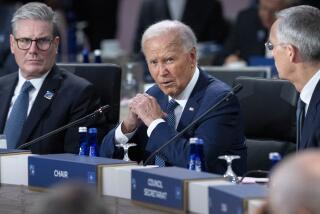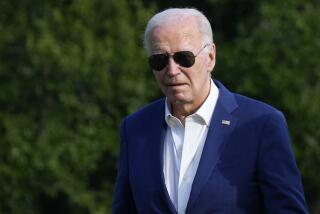Bradley Discloses 4 More Heart Rhythm Episodes
- Share via
MOUNT PLEASANT, Iowa — A month after an irregular heartbeat briefly interrupted his presidential campaign, Bill Bradley disclosed Thursday night he has suffered four more episodes in the intervening weeks. The most recent occurred Sunday.
Although he downplayed the seriousness of the incidents, which have increased in frequency, the revelation immediately renewed questions about Bradley’s health and why he has not been more forthcoming about his condition. The candidate acknowledged the repeat episodes only after reporters asked him following a report Thursday night by ABC News.
“It’s a predictable aspect of this particular situation and we’ll make sure you know if I ever see a doctor,” the Democratic hopeful told reporters in a brief news conference before he held a town meeting in this small southeastern Iowa town.
Bradley, 56, who played 10 seasons of professional basketball before being elected to the U.S. Senate from New Jersey in 1978, was first diagnosed with heart rhythm trouble in 1996. The condition, known as atrial fibrillation, affects about 2 million Americans, including former President George Bush.
But Bradley did not publicly reveal the condition until last month, after he abruptly canceled a campaign stop at Berkeley to seek treatment when he experienced discomfort he recognized as a flare-up of his heart condition.
At that time, his primary physician said Bradley had experienced a total of seven episodes, including the one in Northern California. Since then, the candidate said Thursday night, he has experienced another four episodes.
Addressing the most recent reports, Dr. Mark Yusin, a staff cardiologist with the Southern California Kaiser Permanente Medical Group, agreed that Bradley’s condition--even with the increased frequency of the episodes--is still common and not significant enough to warrant special medical attention or alarm.
Yusin said the increased frequency could mean that Bradley’s condition is becoming more chronic. But he added that does not mean he is at any higher risk of serious injury or death. Yusin also agreed that the development was not significant enough for Bradley to interrupt his campaign plans or to visit a physician. In his opinion, however, Yusin said the episodes of irregular heartbeat could be triggered by stress.
Bradley, who takes medication twice a day to treat his condition, said each of the four most recent episodes was self-correcting and did not require him to see a physician. The incidents came to light after an ABC correspondent asked Bradley’s press secretary if the candidate had experienced more episodes.
Speaking of his condition, Bradley told reporters: “It has absolutely no impact on the race or my capacity to have a schedule or my intensity of campaigning. It’s not a matter of being tired. You don’t feel weak, it’s just this odd sensation.”
While acknowledging the number of episodes was more frequent than he experienced in the past, Bradley dismissed any suggestion they may have been related to the stress of campaigning.
Politically, however, the latest revelations were particularly ill-timed, coming just days before the Iowa caucuses, the first contest of the 2000 campaign. Polls show Bradley trailing far behind Vice President Gore in advance of Monday night’s vote.
“This is clearly not helpful,” said Roy Behr, a Democratic strategist who is neutral in the party’s primary fight. “The real test will be in the coming days as people judge whether or not he is being forthcoming. It is possible to reassure people this is not a life-threatening situation. But the real test, will be whether this is a credibility-threatening situation.”
As for why he has not been more forthcoming about the repeat episodes, Bradley told reporters, “you don’t want me to go around disclosing every time I flip out for an hour, or two hours. . . . If there has to be any medical attention given to it . . . you will hear about it immediately.”
After Bradley went inside to begin his session with residents, spokeswoman Anita Dunn said the most recent episodes occurred on either Dec. 27 or 28 and on Jan. 6, Jan. 9 and Jan. 16.
Last month, after the candidate canceled his stop, the campaign released a letter from Bradley’s personal physician detailing a Dec. 3 examination in which the doctor noted Bradley’s condition and the medication he was using to treat it. The letter stated that Bradley had “no structural heart disease.”
“Thus, this rhythm does not in any way interfere with your ability to function,” wrote Dr. Robert H. Heissenbuttel.
On Thursday, David Ciraulo, medical director of cardiology at Daniel Freeman Hospital in Inglewood, said of Bradley’s condition, “It won’t affect his ability to be president, nor his longevity. For a lot of otherwise healthy people, it’s more a nuisance or a source of discomfort than a health risk.”
More to Read
Get the L.A. Times Politics newsletter
Deeply reported insights into legislation, politics and policy from Sacramento, Washington and beyond. In your inbox three times per week.
You may occasionally receive promotional content from the Los Angeles Times.











